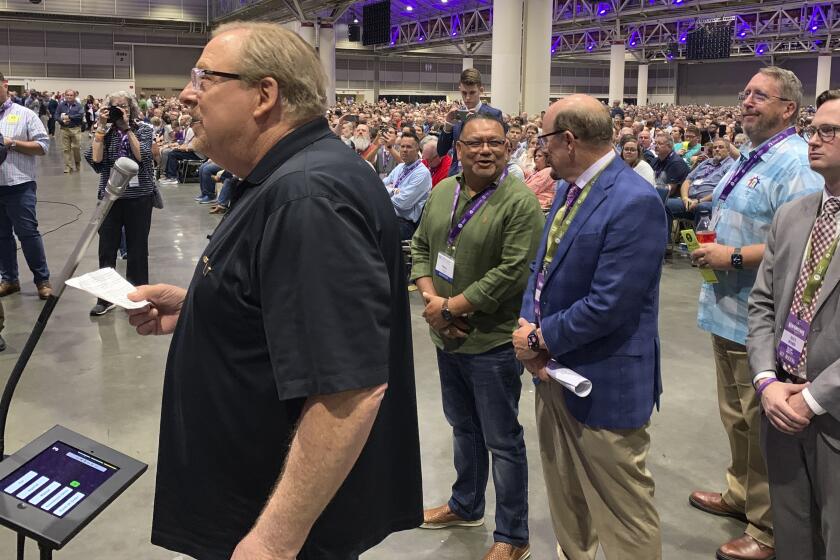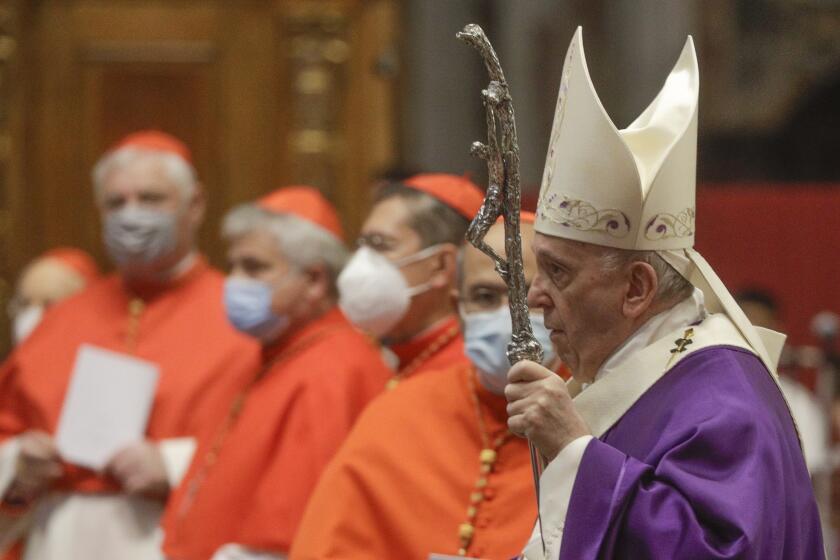Opinion: Are women in the pulpit the reason mainline Christians are leaving the pews?

This week marks the 50th anniversary of the ordination of 11 women as priests in the Episcopal Church, and the milestone is being cited by some commentators as the beginning of the decline of the denomination.
As an Episcopal priest and a student of American religious history, I heartily disagree.
On July 29, 1974, amid threats of violence, three bishops ordained 11 deacons into the priesthood at Church of the Advocate in Philadelphia. The act was brazen and, according to the canons of the Episcopal Church, illegal.
At the denomination’s General Convention in 1970, women were seated in the House of Deputies for the first time, and until then, they had been ordained as “deaconesses,” to distinguish them from male deacons. The convention that year eliminated the distinction, raising hopes that at the next gathering three years later, the convention would approve the ordination of women to the priesthood.
Saddleback Church expelled. Women denied ordination. The Southern Baptist Convention thinks it’s arresting a slide to liberalism, but it’s really on a slippery slope away from Christ’s teachings.
The 1973 General Convention, however, refused to allow women’s ordination. “Grace is channeled through men,” one of the priests thundered.
Nevertheless, to paraphrase Mitch McConnell, they persisted.
Strategists decided that more than one woman should be ordained and that more than one bishop should preside — protection in numbers. Inquiries were sent to 14 female deacons. Those who agreed to the plan, one recalled in a remarkable new documentary, “The Philadelphia Eleven,” were “not the same by any means. Conservative and liberal and progressive and radical and right on the edge.”
Church of the Advocate was chosen as the venue because of the prophetic voice of Paul Washington, its African American rector, or lead pastor. As word of the impending ceremony leaked to the press, participants faced threats of violence. Police were mobilized outside the church.
The ordinations proceeded, in joyful celebration. Barbara Harris, who 15 years later would be the first female bishop of the Episcopal Church participated in the ceremony.
The cameras clicked furiously as the twig-thin woman in a long, black fur stepped toward her stretch limousine.
Reactions were swift and decisive. The church’s leaders were summoned to an emergency meeting at a central meeting place, Chicago’s O’Hare Airport. Unsurprisingly, they declared the ordinations invalid. Many women also opposed. “It is simply a role that a woman cannot fill,” one said. “I’d be delighted if they go away,” a man, who referred to the “priestesses” as “11 little Indians,” said.
The first time the women presided at Communion took place not in an Episcopal church but at the interdenominational Riverside Church in New York City, in October 1974. The road to acceptance was long and tortuous. Pastors who invited the women to celebrate Mass in their parishes imperiled their own livelihoods. “Your career is over,” Peter Beebe, then the rector at a church in Oberlin, Ohio, was told.
L.A.’s Episcopal Diocese elects its first woman bishop
Beebe, however, invoked the civil disobedience of the Civil Rights movement and named the hypocrisy, especially to a bishop who had marched with Martin Luther King Jr. at Selma. “How dare you preach to this country... ” Beebe said to him, “and not to your own institution?”
Even the vote at the 1976 General Convention to validate women’s ordination did not end the backlash. One of the most riveting clips in “The Philadelphia Eleven” comes from William F. Buckley’s “Firing Line” television program. Buckley, usually intelligent and articulate, could also be smarmy, and the clip captures the latter as he set up his Episcopal guests, a layman and a bishop, both of whom opposed women’s ordination.
“The notion that the ordination of women should be supremely offensive requires a little explanation,” Buckley began, punching the words “supremely” and “offensive.”
“It seems as if we’ve lost our moorings, we’ve lost our standards,” the unidentified lay guest responded. “We have no sense of authority anymore.” The bishop replied that the issue was both theological and moral. “It’s not just the ordination of women; it’s the entire breakdown of any moral standards within the life of the church.”
Neither guest was asked to explain how moral standards were compromised by the ordination of women.
Women becoming priests without Vatican’s blessing
The Episcopal Church was not the first American denomination to ordain women — there is a long history of women ministers in the U.S. dating back to the 19th century — but the battle half a century ago was a significant one because of the church’s cultural prominence.
It’s worth noting that the Southern Baptists reversed course on women’s ordination following its conservative takeover in 1979. To this day, the largest Protestant denomination in the U.S. is as adamant as Roman Catholics in refusing to ordain women. As Jimmy Carter, a Southern Baptist, has pointed out, it’s easy to cherry-pick passages from the New Testament and wrench them out of context to justify the subordination of women, but that misses the bigger picture.
The Philadelphia ordinations changed the Episcopal Church. Many congregations left the denomination, and the historian in me hastens to point out that this may be only the second major instance in American religious history when a religious group chose effectively to diminish its numbers in obedience to the mandates of the Gospel. (The other was the 18th century reformation of Quakerism in Pennsylvania to reclaim its pacifism.)
The kerfuffle over women’s ordination, however, prepared the Episcopal Church to weather the storms surrounding the ordination of gay priests and the consecration of a gay man, Gene Robinson, as bishop of New Hampshire in 2003.
Pope Francis changes church law to allow women to do more things during Mass, with access to the altar, but reaffirms that they cannot be priests.
Have numbers declined? Yes, without a doubt, but that trajectory began in the mid-1960s and is common to all “mainline” denominations — or as I prefer, “brand-name” churches: Methodists, Congregationalists, Presbyterians, Disciples of Christ, Lutherans and Episcopalians.
But “success” should be reckoned in terms of faithfulness rather than numbers. Jesus, the founder of our faith, never condescended to women, even in the patriarchal context of 1st century Palestine, and St. Paul, the first apologist for Christianity, declared that in Christ there is no distinction between Jew or Greek, slave or free, male or female.
It’s hardly radical to note that institutions are human contrivances and therefore flawed. But institutions also tend to endure, and there is little doubt in my mind that the Episcopal Church will survive and is the better for having welcomed women into the priesthood.
Randall Balmer, an Episcopal priest, teaches religion at Dartmouth College.
More to Read
A cure for the common opinion
Get thought-provoking perspectives with our weekly newsletter.
You may occasionally receive promotional content from the Los Angeles Times.












